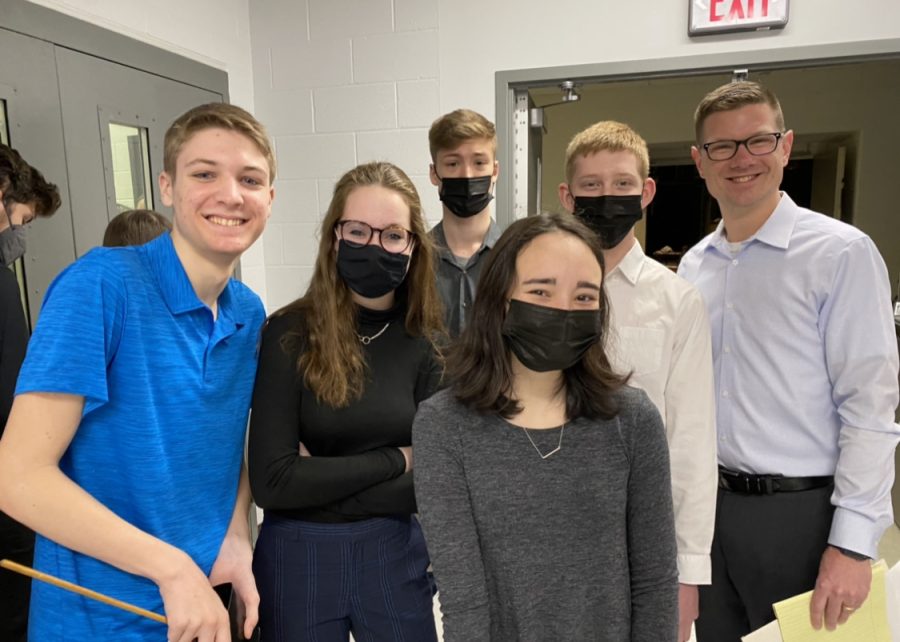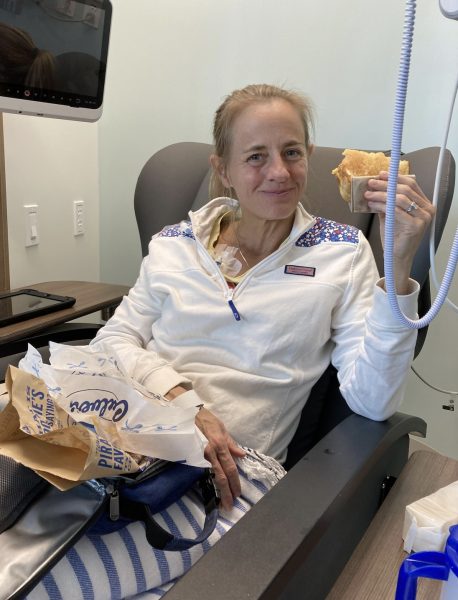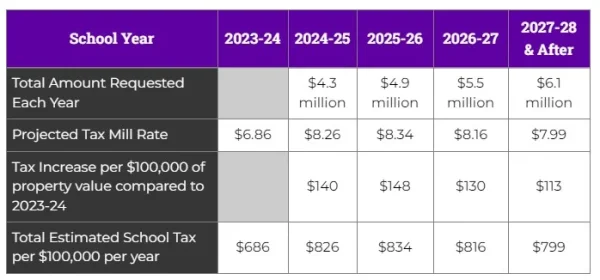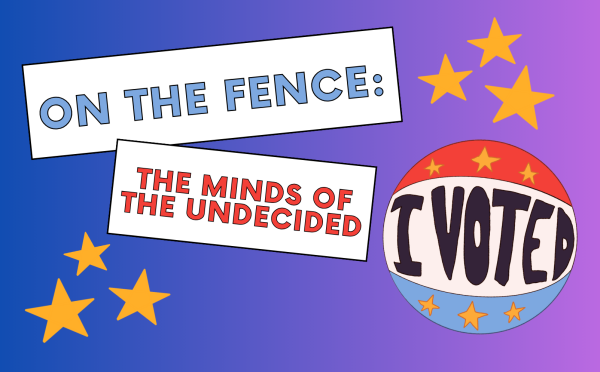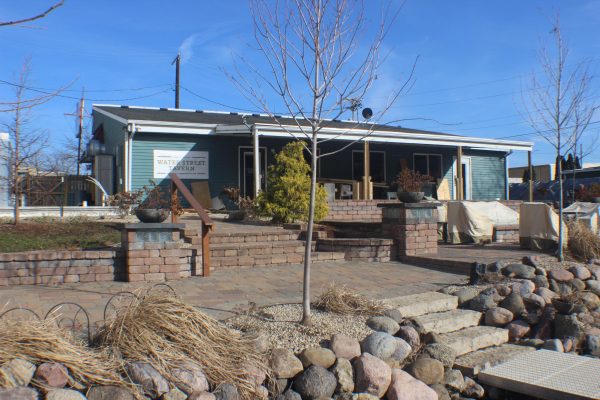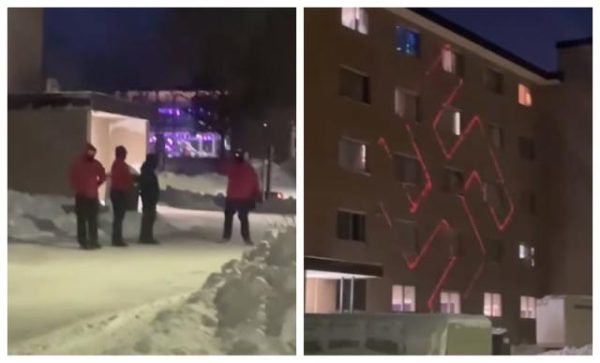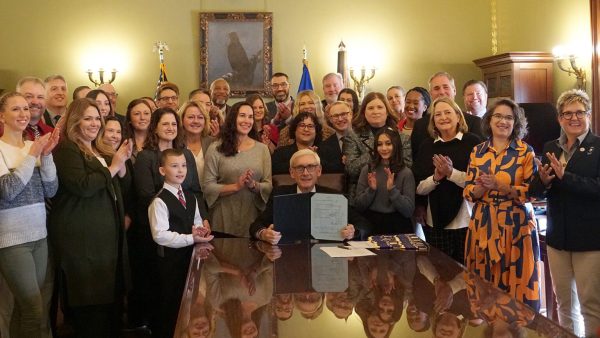Solo & Ensemble
SHS music students perform at local solo and ensemble festival
Jack Nielsen (11), Allie Kolberg (10), Miles Gates (12), Mylah Hall (10), Riley Hansen (10), and Dan Schmidt pose moments before performing their percussion piece.
At almost any given time of day, you can walk through the halls of SHS and hear music. For the past six months our band, choir, and orchestra have been working tirelessly to prepare for Solo and Ensemble, and last month, the time finally came to show their effort off.
“The Solo and Ensemble Festival is an event hosted by multiple schools in groups across the state, providing a performance opportunity for musicians to work on varied solo and group repertoire, playing for and gaining valuable feedback from experienced adjudicators,” Rachel Lam, orchestra director at SHS, says. “Solo and Ensemble gives students the opportunity to play and perform music that is different from what we play in a normal group performance class and receive individualized feedback on their playing. Small group and solo music is just as important and fun as group music, and can ultimately be more challenging [while encouraging] the growth of independent musicianship on a wider scale.”
The festival occurs once every year in the Spring, typically in late Feb. or early March. Initial Solo and Ensemble functions are held locally, with anywhere from two to four school districts competing. Three school districts participated this year – Verona Area School District, Oregon School District, and Stoughton Area School District, with SHS hosting the festivities. From those three respective districts, students grades 6 through 12 performed on March 5.
Before the pandemic, the event was largely open to the public and free to spectate. However, those guidelines have changed in the past few years.
“The festival day itself, where students actually do this performance, is always open to the general public. It’s a really cool opportunity for people to see all kinds of different music in their own backyard, and we really encourage students to go see multiple things, especially things that aren’t performed by students, but with a pandemic, in this current stage we’re just trying to give everybody an opportunity to participate in the most comfortable way possible,” Dan Schmidt, SHS band director, says.
“It’s a festival where people come from different school districts and play all different types of instruments. Literally every instrument is there,” sophomore Ella Loup says. “Students can play solos or in a small ensemble. I think the biggest group this year was the saxophone one I was in, which had nine of us in it.”
Loup has been a band participant in the event for four years and is going to state with her fellow aforementioned saxophone ensemble members.
“The event itself is definitely very stressful, and so is preparing for it, […] but it’s very rewarding to perform and get that constructive feedback from judges. It helps to improve your playing a lot, and it’s nice that you can take that experience with you after the fact,” she says.
Students will choose a piece to play or sing early on and spend many hours honing their musical skills until the day of the festival.
“We typically pick our solos near the beginning of the year, in the first quarter,” sophomore Grace Oettel says. Oettel is an orchestra student who has participated in Solo and Ensemble for five years. “We don’t have much time to prepare [initially], due to concerts in first semester, but once it gets closer to Solo and Ensemble, you get more practice.”
There are different classes of music to choose from – Class C, Class B, and Class A – and there’s a grading scale ranging from four to one, with one being the best, and Class A being considered the most difficult. Receiving a one on a Class A piece results in the musician(s) going to State, which is at UW-Whitewater this year in late April. However, going to state is not necessarily the endgame goal.
“It’s about the process, and the growth they experience during it. We’re proud of all of our students for their performances during [the event],” Schmidt says. “Solo and Ensemble is important because it gives you the ability to perform something that you normally wouldn’t ever do. We all signed up for the music classes that we did because we like making music together. However, there’s a lot of benefit from playing in a smaller group, playing alone, singing alone, and things like that. […] Performing music like this really helps us get in tune with what music making is like in all aspects, not just in a large way.”
Loup agrees, and claims that the process behind Solo and Ensemble has made her a better musician.
“It’s like a workout,” she says. “You might not necessarily enjoy it [in the moment], but it makes you stronger, and you’re thankful for it later.”
“It’s important because the festival helps you prepare for more professional music opportunities,” Oettel adds.
The festival is an amazing experience for both performers and spectators alike. Music students are able to practice difficult pieces, while growing their confidence and being critiqued by professionals. Though nerve-wracking for many, Lam and Schmidt both believe all students excelled and state they could not be more proud.
“The students did a wonderful job! I am so proud of my students. The time put into practicing a challenging piece can be difficult, but worth it,” Lam says. “They received valuable feedback that is going to help them on their musical journey. It’s wonderful to see the hard work of so many students come to fruition. We truly have a great music community at Stoughton High School.”

